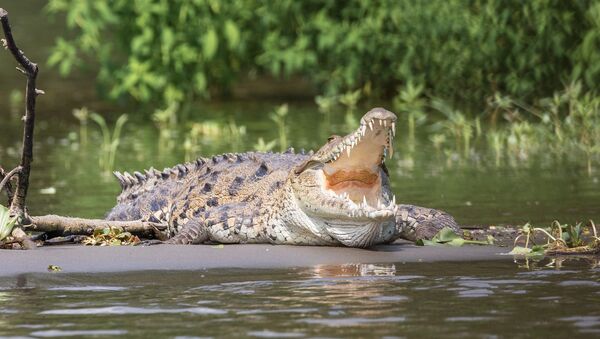"All is not bleak", stated the Wildlife Trust of India (WTI) while sharing pictures of the crocodile hatchlings, some still peeking out of the eggshells. The trust released a total of 116 hatchlings into a river in India’s Bihar state on Wednesday, of which 30 eggs hatched on the same day without the team's supervision.
“In some great news, these hatchlings emerged after successful incubation of 65-70 days from nests protected by community watchers deployed in the project", stated the Wildlife Trust of India.
#We released 84 hatchlings of the #CriticallyEndangered #gharial into River #Gandak #Bihar Read story👉https://t.co/XG3r90HItS
— Wildlife Trust India (@wti_org_india) June 17, 2020
Happy news on #WorldCrocodileDay ! @vivek4wild @DipakKrIAS @DEFCCOfficial @LAZoo @IUCN @wild_haathi @subrat_behera pic.twitter.com/i6ZGkF8cR8
94 eggs of the critically endangered crocodiles were found during the lockdown period by a team from the WTI working under biologist Subrat K. Behera to save nest eggs from riverbank erosion, especially during a severe local storm on the 14 April.
All is not bleak on India's #conservation front as we share this happy news on #WorldCrocodileDay. Read here about 84 newly hatched #gharial joining the adults in the River #Gandak. https://t.co/XG3r90HItS @ConservOptimism@CentralIfs @moefcc @ParveenKaswan @susantananda3 pic.twitter.com/A1jhViOV6T
— Wildlife Trust India (@wti_org_india) June 17, 2020
“Soon the hatchlings will be in a crèche close to the mother and till the monsoon flood comes they will be guided by the mother to avoid flash floods taking them into sheltered lagoon-like situations”, said Professor B.C. Choudhury, an IUCN Crocodile Specialist Group member.
According to the environmentalists, there are only six confirmed breeding sites of the endangered Gharial species of crocodiles spread between the riverine ecosystem of India and China. The fish-eating reptiles are one of the longest species of living crocodilians.


